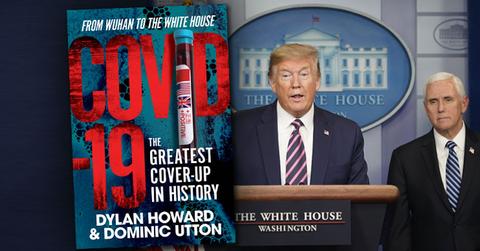 EXCLUSIVE
EXCLUSIVEBombshell! WHO Ignored COVID-19 Warnings And Praised China, New Book Reveals

Oct. 8 2020, Updated 6:50 p.m. ET
The World Health Organization ignored historic Chinese obfuscation and should have been more cynical about data shared by the country in the early days of the coronavirus outbreak, according to the first published global investigation into the pandemic.
Authors Dylan Howard and Dominic Utton offer a damning verdict on WHO's handling of the crisis in their book COVID-19: The Greatest Cover-Up in History — From Wuhan to the White House.
With meticulous research, the authors reveal how the organization knew as far back as 2003 that China was untrustworthy. In May that year, during the SARS pandemic, a WHO spokesman openly criticized the regime, declaring that missing data, withheld information, and a lack of cooperation was hampering vital work.
COVID-19 COVER-UP UNEARTHED IN NEW BOOK AMID WHITE HOUSE HEALTH SCANDAL
Despite this, the organization chose to believe the false information being issued by China, even in the face of contradictory evidence from more reliable nations.
The book, to be published before the election by Skyhorse Publishing reveals that the WHO ignored a warning from Taiwan about the human-to-human transmission of COVID-19 in December 2019, when China denied there was any danger. Taiwan's government was monitoring travelers arriving from Wuhan after reports of mysterious "pneumonia" infections in the city. Taiwan authorities contacted the WHO to advise that health care workers had been falling ill — indicating that the virus was spreading between people. According to a Taiwanese Government spokesman, the warnings were ignored.
INSIDE THE EXPLOSIVE WHITE HOUSE COVID-19 CRISIS — EVERYTHING WE KNOW
The authors write: "Was this another example of the WHO bowing to pressure from Beijing — which has blocked Taiwan from joining the United Nations and the WHO for decades?"
The book highlights how the WHO did not recommend lockdown as an effective measure in controlling the spread of the virus and how it only declared COVID-19 to be a pandemic in mid-March. Up until that point its reactions had largely been informed by China, which was taking great pains to cover up the true extent of its handling of the virus.
On January 4, the organization made its first announcement, tweeting: "#China has reported to WHO a cluster of #pneumonia cases — with no deaths — in Wuhan, Hubei Province. Investigations are underway to identify the cause of this illness." On January 9, the WHO repeated an assessment that the virus "does not transmit readily between people," and went on to praise China for identifying the new virus.
Want OK! each day? Sign up here!
CANNED! CORONAVIRUS CHAOS CAUSES SHUTDOWNS AROUND THE WORLD
A WHO team did not visit Wuhan to investigate until more than two weeks after the first announcement. Their report, published on January 22, finally confirmed that, contrary to earlier statements, human-to-human transmission was taking place and that there had been confirmed infections in at least 16 medics.
Despite the obvious cover-up, the WHO again praised the Chinese government for its "invaluable" efforts to halt the virus and expressed admiration for China's "cooperation and transparency."
Five days later, on January 28, Dr. Tedros Adhanom Ghebreyesus, WHO Director-General, met Chinese President Xi Jinping and lauded "the transparency" of the Chinese Government. The following day Dr. Tedros gave a speech in which he said the regime "deserves our gratitude and respect" for locking down cities to prevent the spread.
TRUMP VS. BIDEN — A LOOK AT THE SEXUAL HARASSMENT ALLEGATIONS MADE AGAINST THEM
Two days later, Dr. Tedros insisted the Chinese regime had "set a new standard for outbreak response."
It was not until February 17 that the WHO began daily updates on the response to the virus. On March 11, it finally declared COVID-19 a pandemic. By this point, more than 126,000 cases had been reported worldwide and 4,628 people had died.
The response was a far cry from 2003 when the Chinese government belatedly informed the WHO about the SARS epidemic and the organization took swift and decisive action. That outbreak was contained by July the same year with fewer than 1,000 dead.
JIMMY KIMMEL, SOPHIA BUSH AND MORE CELEBS REACT TO TRUMP'S COVID-19 DIAGNOSIS
Shockingly, the authors point out that today, the WHO is largely toothless and underfunded. Indeed, its annual operating budget is smaller than that of many university hospitals and is split across a wide range of projects worldwide.
"It remains an advisory — only body — able to make recommendations to countries concerning the health of their citizens and how best to prevent or combat disease outbreaks … but with no actual power to enforce those recommendations. Nobody has to do what the WHO tells them to do," they write. "And the fact is, many countries don’t like being told what to do."


